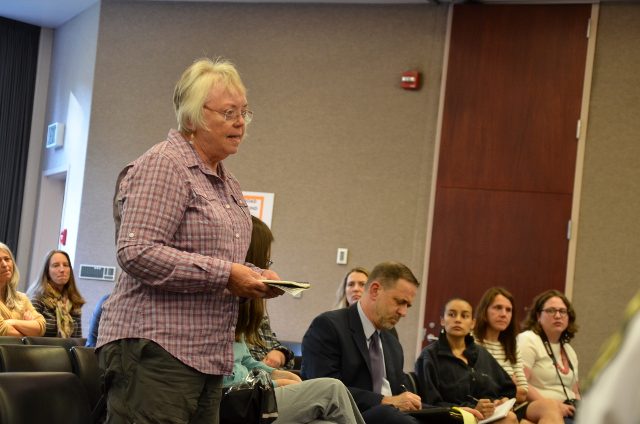
(Photos: M.Andersen/BikePortland)
An impressive array of local officials heard from grieving relatives and others Monday in a “listening session” about the costs of traffic violence.
“We need to face the fact that quick, convenient personal auto travel in a city has unacceptable social costs.”
— Damian Miller, Friends of Barbur
Monday night’s panel at a Legacy Emanuel Medical Center conference room included Portland’s mayor, transportation commissioner, transportation director and chief of police; a Metro councilor; a state senator; and representatives of TriMet, the city fire bureau and state transportation department. Two dozen other local residents attended, telling stories about loss and calling for safety to be a higher priority than speed on city streets.
Ginger Edwards of the Arbor Lodge Neighborhood Association rose to tell the story of Brian Duncan, immediate past president of their neighborhood association, who one month ago was biking across Rosa Parks Way with his wife and two-year-old. Edwards said an “84-year-old driver” who was headed toward the sun ran a red light and collided with Duncan as his family watched, breaking Duncan’s neck and paralyzing him from the neck down.
“Brian was acting safely,” Edwards said. “The driver was not.”
Edwards said her association is organizing a bicycle Ride of Silence next week, May 18 at 6:30 p.m. at Arbor Lodge Park, to commemorate victims of unsafe streets.
Fixes are within reach, attendees say
As other attendees spoke, some proposed possible solutions.
“Money helps a lot,” said Jessica Engelman of BikeLoudPDX. “But please stop hiding behind the money. There are so many things you can do without money.”
Engelman applauded the city’s choice to restripe Southeast Foster Road for safer pedestrian crossing by replacing two passing lanes with a center turn lane. She called for more restriping of four-lane streets such as Hawthorne Boulevard or outer Division Street.
“Money helps a lot, but please stop hiding behind the money. There are so many things you can do without money.”
— Jessica Engelman, BikeLoudPDX
“We need to face the fact that quick, convenient personal auto travel in a city has unacceptable social costs,” said Damian Miller of Friends of Barbur. “I would urge you to reconsider what it means to be a successful city. … Often times, successful cities are congested.”
Miller said he was disappointed that the state’s regional transportation manager, Rian Windsheimer, had chosen not to attend. In Windsheimer’s absence, Miller directed his remarks to ODOT’s regional policy and development manager Kelly Brooks, who came instead — and also to state Sen. Michael Dembrow.
Duane Anderson of AARP Oregon rose to point out that people over 65 represent 13 percent of Oregonians but 22 percent of traffic fatalities.
“The older population is more vulnerable to traffic accidents,” he said.
Advertisement
Keep evangelizing for safety, Novick says
For his part, Transportation Commissioner Steve Novick acknowledged the need for change. He called on attendees to spread the word to their peers as well as to leaders.
“We need to hear from you, but your fellow citizens need to hear from you too,” he said.
Novick said that when he had attended a meeting of people who oppose the Foster Road redesign, he was grateful that people who live in the area and support the redesign had shown up, too. He urged attendees to step into conversations they overhear to talk about the importance of safety. And he also asked them to send emails to Oregonian editorial writer Erik Lukens, whose newspaper last month opposed a local gas tax on the grounds that 44 percent of its revenues would go to safety improvements.
“Tell him to get with the program or get the hell out of town,” Novick said.
Proposal for re-licensing tests draws interest
But of all the ideas floated Monday for improving streets, one new one seemed to catch the attention of politicians present: the fact that Oregon lets people renew their driver’s licenses without demonstrating that they still know the traffic laws.
“You could drive for 60, 70 years and never have new education. And things have changed a lot in 60 years.”
— Judge Steve Todd, Multnomah County Circuit Court
“You could drive for 60, 70 years and never have new education,” said Steve Todd, a traffic judge with Multnomah County Circuit Court. “And things have changed a lot in 60 years, I can tell you that.”
Steve Vitolo, a former Polk County deputy sheriff and ODOT safety official who now runs a company offering driver education for Oregonians convicted of traffic crimes, said it wouldn’t be hard for the state to tally up the handful of changes to the vehicle code each year and require people who have state driver’s licenses to complete an online quiz about them.
To renew a driver’s license after eight years, Vitolo said, you might have to prove that you’ve taken the quizzes at some point.
Mayor Charlie Hales called Vitolo’s suggestion “fascinating.” Sen. Dembrow agreed.
“I’m really intrigued by that and it makes a lot of sense,” he said. “I would be happy to work with the city on that.”
Novick was also interested.
“That’s the kind of interaction between citizens and their government that we should have,” he said.
— Michael Andersen, (503) 333-7824 – michael@bikeportland.org
Our work is supported by subscribers. Please become one today.



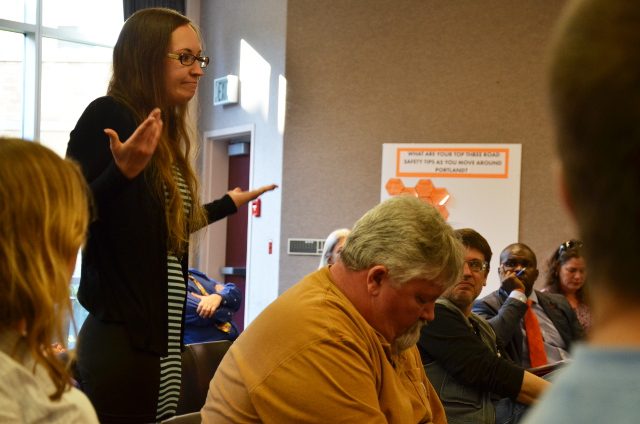
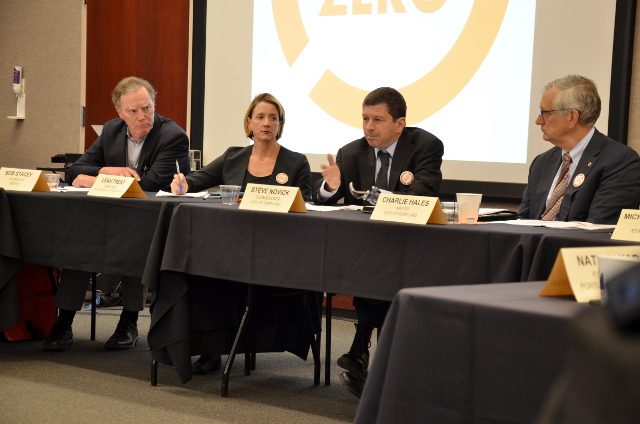
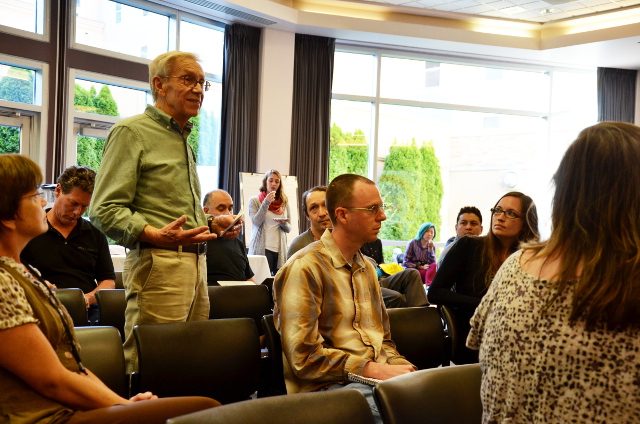
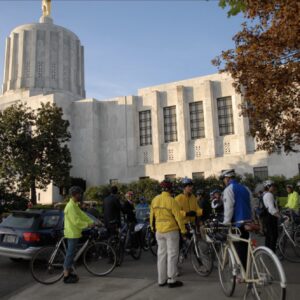

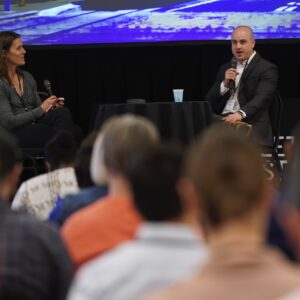
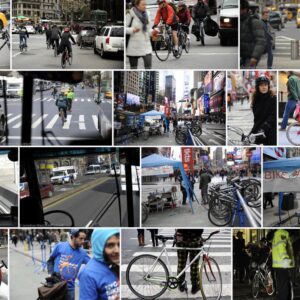
Thanks for reading.
BikePortland has served this community with independent community journalism since 2005. We rely on subscriptions from readers like you to survive. Your financial support is vital in keeping this valuable resource alive and well.
Please subscribe today to strengthen and expand our work.
El Biciclero (among others) has been suggesting exactly that (retesting) here for years.
It’s been one of my big sticking points for years.
Devil’s advocate question here:
Does anyone see this as a potential slippery slope on the way to mandatory bicycle testing, licensure and insurance?
As long as the vehicle code considers bicycle to be vehicles along with cars, it’s a possibility.
Never mind the administrative costs. Government has passed laws in the past that were essentially underfunded mandates — meaning that law enforcement was free to selectively enforce as they deemed necessary. Is anyone else seeing the possible flip side of such an argument here?
“Does anyone see this as a potential slippery slope on the way to mandatory bicycle testing, licensure and insurance?”
Logically, no. Moving about under one’s own power is or has to date been considered a right, not a privilege. But does that mean the clowns at ODOT or the DMV or out legislature wouldn’t consider it, probably not. Here’s some language that I dug up in a conversation here a few years back about licensing vs. certification:
http://bikeportland.org/2012/08/24/opinion-licensing-debate-should-focus-on-reform-not-revenge-76495#comment-3186946
LICENSING
A license is a permission to do something that otherwise is forbidden. In most cases, a license is required or mandatory for engaging in that activity. For instance, a drivers license is considered mandatory to drive a car on the public roads. […]
The purpose of licensing, whether admitted or not, is to restrict entry and control a profession or activity.
CERTIFICATION
Certification is a statement or declaration that one has completed a course of study, passed an examination, or otherwise met specified criteria for certification.
Certification is not a permission to act, but rather a statement of completion or qualification.
I see and don’t care. This is triage–stop the bleeding first.
“Does anyone see this as a potential slippery slope on the way to mandatory bicycle testing, licensure and insurance?”
Absolutely not. Driving a motor-powered vehicle is not legally a right, but a privilege – as was pounded into the heads of those who originally obtained our driver licenses in Drivers Ed states (not Oregon!)
Traveling under your own power, on the other hand, is a right. No license required. Although Oregon law recognizes cyclists’ ability to use the roads by designating our rigs as “motor vehicles” for purposes of traffic law, this is still a huge fundamental difference.
The only mechanism for making it illegal for someone to ride a bike would be for a judge to impose it as a condition of sentencing, presumably for committing a crime while bicycling.
Ugh, no. You’re the leader, Mr Novick. You and many others already understand the need for traffic safety. Now take action, instead of hosting more “listening sessions” for people to tell you what you already know. Take action, now!
Are you serious? Building public support is critical. We can both ask for our leaders to do more and help play a part in making those efforts successful. Steve Novick can’t reach out to every citizen in Portland to inform them. Who do you think is going to get people to vote yes on the gas tax?
For many things, I’d agree with you, but in this case, we should not have to “build public support” to improve safety. Keeping its citizens safe is a primary function of city government. You wouldn’t ask the city to build public support for keeping our water supply free of lead, would you? It’s just assumed this is the default function of the Water Bureau (and explains the massive outrage in Flint when this trust is broken). Why is the same standard not applied to transportation?
Excellent point, Adam.
“Why is the same standard not applied to transportation?”
Because to do this is perceived to infringe on the fantasy of the car-as-personal-fetish.
“Building public support is critical.”
and you get that public support by doing the right thing and letting people know about it, not by asking them if you can do the right thing… people shouldn’t be asked if they want the government to do the right thing, that’s why democracy doesn’t work for such things, because people are selfish…
If you claim to be a safety advocate, but don’t actually engage your friends, family and neighbors in the discussion, you’re part of the problem.
Trust me, my friends, family and neighbors have heard plenty from me. However, I’m just one “crazy bike advocate”. Our city leaders have a much greater reach than I and they should use this privilege to convince us that we need traffic safety. Not the other way around. We need leaders to lead.
Take your opinions to office. Be the change.
I think many people understand the need for safety on the streets and roads, but may not be familiar with, or understand the means needed to get it.
Maybe people understand better, and more readily accept, the means needed to be taken to have water purity, than they do concepts and the means inherent to it of the so called ‘vision zero’, that has ‘no more deaths on streets and roads’ as its prime objective.
There does seem to be a lot of people on the road that perhaps don’t acknowledge their obligations to safety in driving a motor vehicle, or riding a bike, or respect the priveledge. I had a bad experience last night: On foot, trying to cross an un-signaled exit lane onto a traffic island. The person driving, well before reaching the point where I was preparing to cross, passed a sign announcing ‘Yield to pedestrian (symbol)’. Yet for some reason, he either simply didn’t want to yield to someone on foot, and was prepared to break the law to follow through on that desire, or didn’t believe he was legally obliged to do so. Clean cut younger guy, driving a nice mustang, younger kid in the seat next to him.
I’ve heard it’s very tough to get a license to drive in some countries of the world, for example, Japan and the UK. Passing the test requires reasonable literacy, lots of study, and intensive written and driving tests. If that’s true, maybe to get better safety in road use, we in the U.S. need to move closer to that example.
I don’t like the idea of arbitrarily putting barriers before people that must have personal operation motor vehicles to meet basic day to day needs, so I wouldn’t support that, but something has to be done to screen out people that can’t or won’t drive safely.
I think more people understand the need for water purity because everyone drinks the water that comes out of our taps.
People don’t understand the need for pedestrian and bicycling safety because that’s not how a lot of them use the transportation facilities,
This weekend I was at a Home Depot. There was a foklift moving from one side of the parking lot to the other side hauling a pallet of plants. It was driving in the same lanes as the cars do as they circle to park. Except, the forklift was driving at 5 mph and had an employee walking in front of it holding out two red flags to warn oncoming pedestrians, while the cars whizzed by in all directions. Someone at OSHA or the company saftey committee or liability insurance carrier determined that the only way to safely drive a multi-ton motorized vehicle in proximity to other humans was to go very slow and have a flagger walking in front. Maybe we need to wake up and realize that cars and humans don’t mix. Giving old people another driving test is better than nothing, but it is not going to fix an insane situation
Something tells me OSHA doesn’t believe in acceptable losses the way ODOT does.
The license retesting is for everyone, not just the most experienced road users.
old does not equal experienced…
Thank for the important reporting. I do want to note that in the past, approx 2005-09, the BTA had worked with a coalition on a similar concept. We had received some pretty decent support, including conceptual support from the ODOT Transportation Safety Division. I am not sure if those conversations continued, I would not be surprised if they did.
A re-test seems like a no-brainer to me.
I just had to get my driver’s license renewed (yes I have one! Sorry to burst all your “he’s-a-bike-blogger-so-he-must-hate-cars” bubbles)… While I waited for my number to be called at the DMV I read the entire driver’s manual and took all the practice quizzes because I assumed I would be re-tested. Then I wasn’t tested! I thought it was crazy that I could be at the DMV and just walk out with a new license w/o proving anything about my knowledge of laws.
The only opposition I could see to this law change would be the potential fiscal impact… But I’d love to hear lawmakers try to tell voters that their lives aren’t worth money.
It’s pretty commonly understood that the majority of regular bicycle users are licensed to operate automobiles and tend to own them as well.
I wish it were more commonly understood. Sigh.
We should even make this more than just a written re-test. Lets turn some abandoned megamalls ( more common in some states) in to giant closed course driving tests grounds. Have pop ups, automated cyclists, etc and test everything from knowledge of laws to reaction time. Build the cost of this testing in to every new liscence or renewal. We have a bias towards making sure nearly everyone can drive, but this attitude is long passed it’s sell date.
Because they only re-test drivers they think have become senile and incompetent, testing seems to now be seen as an insult. Test everyone in some way or another, every renewal. Were the test to include a driving test (much more expensive in time and labor), the DMV should make a point to text something to the phone number that they probably already have. Applicant turns his/her attention to the phone, automatic fail.
What exactly is wrong with hating cars? For all the pollution and deaths they cause, I find it bizarre that you’d act like it’s only crackpots who want to see fewer cars and more humans on our roads.
Agreed! Chasing Happy Motordom has done untold damage to our land, resources, and cities. Perhaps if we hadn’t abused the privilege so much since 1940 we wouldn’t even be having this conversation today.
Our mere existence has done untold damage to the land and resources.
Cut Portland’s population by 1/2 and watch all of our problems melt away.
Yes, cut Portland’s population (623,000) in half and you end up with Greensboro (288,000), a city with the same area. By cutting the population, you reduce traffic congestion, allowing cars to go twice as fast, raising the death rate. Nice.
When you say, “hate cars” you automatically alienate a majority of the people who might otherwise be open to your ideas. People may not be in love with their cars anymore, but they may not yet be able to envision life without them. So you come across to them as simply wanting to take away their only conceivable means of transport. And then you wonder why bicycles are hated by a significant number of people in this city?
As i’ve pointed out many times, I moved here in 92, took a 10 question video quiz, missed one about turning left on a red onto a one-way from a two-way (it’s legal – I answered on the side of caution because it wasn’t a legal move in Michigan where I had moved from). Got my license, and haven’t had to do anything but bring a check since.
The licence requirements in Orgon are a joke, and have been for a very long time.
I’ve long joked that every license renewal should come with one simple driving test – parallel park a car. You get one shot in reverse and need to be within 10″ of the curb. If you fail, better luck next year.
This is a very good idea!
I’d say very few people have to parallel park these days. How about a more realistic test: You must start at Legacy in N/NE Portland, get onto N Williams at rush hour, turn into and park in the New Seasons lot (in whatever car you drive – extra tough for big SUVs), then continue north on Williams to Killingsworth, make two lefts and return to your starting spot by way of Vancouver.
Do all that, don’t come close to killing anyone, follow all traffic laws, and you passed. If your skills, knowledge, or reaction time aren’t up to snuff, see ya next year.
Thinking about doing that makes my skin crawl. Driving in this town sucks, and I’m so glad I get to mostly-bike.
This is also a very good idea!
After they’ve successfully passed the written and driving tests, I might favor re-licensing examination of people upon their later on receiving a moving violation, or their having been involved in a collision. I’d have to give a lot more thought to routine, periodic re-licensing examination each time a person’s license is renewed.
The whole idea of how literate, intelligent, skilled and knowledgeable a person needs to be in order to qualify for a driver’s license, is an interesting question. The bar for passing the tests in Oregon, is set low, perhaps, because motor vehicle operation is considered so essential for getting to work, school, shopping, etc.
Heard a classic story today, from a friend about their 98 yr old friend, who recently had re-tested and passed the ODL test. Not a lot of them, but there are some people that are very sharp and able, at around that age. Soon after, she crashed into something…I guess no injuries or worse…but from the experience, decided her abilities for the demands of driving, were no longer sufficient, despite her being able to pass the Oregon tests.
Back when California required a written knowledge test with every license renewal, the majority of licensed motorists failed the test on the first try. Interestingly, a substantial fraction also failed on their second go ’round. California’s answer to this: since the test couldn’t be made any easier, they just did away with it.
I’m fed up with ignorant car addicts insisting that there is no crosswalk at the intersection, that a two-foot shoulder is a bike lane, that I have no right to ride in the travel lane etc. We desperately need to raise the bar for obtaining and keeping a license to drive if we are ever going to significantly reduce the gore on our roadways.
“…insisting that there is no crosswalk at the intersection, that a two-foot shoulder is a bike lane, that I have no right to ride in the travel lane etc. …” carfree
Upthread a bit, here:
http://bikeportland.org/2016/05/10/leaders-consider-driver-re-licensing-tests-after-vision-zero-listening-session-183042#comment-6660623
…I wrote of a recent bad experience I had as someone on foot, trying to get someone driving, to yield to me so I could cross an exit lane onto a small traffic island, waiting point for the rest of the crossing of a Hwy 217 parallel access road (east side of 217 at Beav-Hillsdale Hwy).
The crossing design is a peculiar bit of infrastructure, on a curve, and not a standard ‘a to b’, straight across crossing. And truthfully, I was attempting to cross, about 8′, slightly in advance of the painted crosswalk area of the exit lane; doing so because visibility point of people crossing, is clearer to people approaching in the main lane using vehicles, at the point I chose, compared to that of the painted area.
The person driving, did eventually stop, because as he advanced from a considerable distance away, to indicate my need to cross, I had my outstretched arm and hand out, clearly visible. Still, as he got closer, he declined to prepare for a yield by sufficiently reducing his vehicles’ speed. As he was about a car length away from me, I motioned my arm and hand again, and called out ‘Stop! !, to emphasize my need to cross the exit lane. Finally, he pops the brakes, chirping the tires slightly, coming to a stop.
I paused midway across the front of the vehicle, to explain to him, listening through his open driver’s side window, that ‘The sign back behind you says you must yield to pedestrians.’. Response: he toots his horn, trying to get me to complete the crossing, clearing the way for him to proceed. And then says, looking over to the painted crosswalk area, ‘The crosswalk is over there!’.
I shook my head slightly, and said next, ‘Bottom line, is that you must yield to pedestrians! ‘. He didn’t like that apparently, toots his horn again. By this time someone else is behind him in the exit lane, waiting to proceed, so I completed crossing, clearing the lane.
The person looked to me like someone that should be physically capable of safely operating a motor vehicle. His actions and demeanor, and words, left me wondering whether he fully understood basic concepts of the rules of the road that people operating vehicles are obligated to hold themselves to.
Was I technically wrong to not be at the painted crosswalk area in preparing to make my way across the exit lane? Perhaps, but a person not being there, and still in need of crossing the lane, does not relieve people driving of their basic obligation to yield to pedestrians.
Fully knowing and understanding basic rules of the road, and obligations to them on the part of people operating vehicles, is essential to achieving road safety for road users. If it’s true that dangerous encounters between vehicle operators and vulnerable road users is increasing, weak, vague, insufficient instruction and testing of people seeking license to operate vehicles on the road, may be one of the big reasons for this happening.
The fiscal impact would be very low if you charged people an appropriate amount to take the test and renew their license.
In racing, one of the big mantras is “you don’t skimp on safety”. Why should it be acceptable to skimp on safety in a normal driving environment?
Because we’ve been sold this idea that cars = convenience and freedom. Every player has jumped on this bandwagon, from the auto manufactures, to the DMV, state DOTs, lobbyists like the AAA, and lawmakers. Safety interferes with that freedom by restricting what we can do, and after being lied to for the last 70 years, we just don’t know how to handle that. Luckily, this notion seems to be slowly breaking down as people are starting to realize that cars are more of a crutch than an agent of freedom. Can’t happen fast enough.
“…fiscal impact.”
I think any fiscal impact as the taxpayers think of it could be minimized or eliminated by assessing an appropriate fee for taking the re-test, just like for taking the original test to get one’s first license. But then maybe you meant “personal fiscal impact”, as opposed to “don’t raise my taxes” fiscal impact. A big source of opposition, IMO, would more likely be fear of taking more time to renew or of failing the test and becoming unlicensed. Although, I would bet that any re-test requirement would come with a “provisional license” clause that would let anyone continue to drive after failing the test if they promise to re-take the test within 30 days or so.
A requirement to obtain a certificate from an accredited driver education program before getting a first license also seems like a no-brainer to me. Come on, Oregon!
ANNUAL renewal requirements with stringent tests to qualify for a drivers license, not the absurd fog-a-mirror test they give today.
Lets remember that Novick and Hales assumed office in 2013 and promptly cut active transportation funding while emphasizing motorvehicle throughput (paving and potholes):
https://www.portlandoregon.gov/transportation/article/497407
While we need more evangelizing from advocates we also need politicians willing to take on political risk. People dying in our roads should not have to compete with the PBA or freight interests for funding priority.
It is truly sad that working to improve safety is now considered a “political risk”. I guess it speaks to how spineless our city council has become.
Paving and fixing potholes also encourages more active transportation. I’d rather ride my bike down a newly repaved road than one that consists of broken chunks, holes, random gravel, and seams.
“I’d rather ride my bike down a newly repaved road than one that consists of broken chunks, holes, random gravel, and seams.”
I personally think this is a risky take on smooth asphalt. Skinny tired bikes, like high heels came about in the last century because you could count on ubiquitous smooth hard surfaces on which both could be reliably used. But whether or not we like it, the future is likely to have fewer smooth, hard, regularly maintained surfaces. But lucky for us, bikes do just fine on bumpy, poorly maintained roads, much better than automobiles.
Like you, I will swerve to avoid a pothole, just as I will seek out the cheaper gas station, but once I understand the larger context, what it takes to provide this ‘convenience’, I realize that I’d prefer to prefer much more expensive gas and less well maintained roads.
Good thing I just put 47c tires on my bike!
It needs to become much more difficult to obtain and keep a driver’s license.
I’m sad to say I have seen several people in my line of work who kept driving long after they should have stopped. In one case an individual was reported to the DMV ( after multiple crashes ) and was required to retest. The individual failed the test and was then granted two additional attempts to pass before their driver’s licence was revoked. The individual maxed out the interval between re-tests resulting in an additional six months of driving AFTER it was determined that they should not be driving in the first place. Luckily no one was killed in that time. The current system is so broken my only real hope is that self driving cars will remove most human drivers soon.
Is there a list of Vision Zero listening events somewhere?
And well done, Ginger!
Sign up for email updates on Portland’s Vision Zero here
https://www.portlandoregon.gov/transportation/40390
For example, there’s public comment at the Task Force meeting this Thursday.
https://www.portlandoregon.gov/transportation/article/576018
Thanks!
For everyone else: sign up to the vision zero email list here: https://public.govdelivery.com/accounts/ORPORTLAND/subscriber/new?topic_id=ORPORTLAND_36
Whether driving or riding, I just assume that everyone out there is squinting into the sun and stay on guard.
That will only keep you so safe. You can also assume that everyone is drunk, stay on guard, and still be killed. I had exactly that conversation with my son right before he was killed. “I don’t trust anyone, Mom. I have eyes in the back of my head.” Then when your son dies you hope he really didn’t have eyes in the back of his head because you hope so hard he didn’t see that drunk coming, you hope he was singing to himself, happy happy happy dead, instead of oh shit, oh shit, I’m gonna die and there’s nothing I can do about it dead.
I trust exactly zero drivers to do the right thing.
I’m sixty-one years old and am goiong out of my way to do frequent nighttime cycling–the better to keep my ass out of the drivers’ seat of a car when my eyesight is no longer sufficient to drive a car at night. Keeping my night riding chops up seems like the right thing to do–I will hopefully be a safe night cyclist for some years after I’m no longer a safe night time driver. And, please, precious Portlanders, there are whole groups of people whose driving ability needs to be scrutinized more closely. I’m close to being in one! Sometimes, discrimination against whole groups of people has a basis in reason.
How will you know when you are no longer safe behind the wheel? You can’t see what you no longer see. You can’t assess the added reflex time, reduced cognition and added time to recover vision from headlight blindness on your own.
I can tell that my eyes work differently when catching glare at night through a windshield.
I’m fifty-three, and suffer from partial night-blindness as a side-symptom of Crohn’s disease. I can still have good reaction time if riding my bike on well-lit urban streets, at bicycle speeds — but can no longer drive a car at night at all.
At some point I suspect I will have to stop riding a bike at night as well. And when that time comes, I will stop. It will be hard, but I will do the right thing.
It’s important to have a real eye exam every few years — for glaucoma and other eye health issues — and to know when it’s time to stop operating a vehicle.
Not to mention that driving laws and conditions change. Renewal should include retesting, but it should also include an update regarding new laws that have been created.
I am always surprised at the lack of basic understanding of things like “it is illegal to left- or right-hook a person on a bike.” When I was recently taken down by an SUV, the “concerned citizens” that offered their expertise at the scene essentially believed that autos always have the right of way over bikes and not running over cyclists is a courtesy afforded out of the benevolence of the driver, not the law.
And, if you drive in Oregon more than 20% of the time, you have to know Oregon laws.
I am also shocked when elected officials respond as if this is the first time they have heard this idea or thought about it. Where have they been?
Most elected officials would rather wear a Klan robe or a swastika in public than speak in favor of more rigorous regulation of motor vehicle operators. I’m not shocked in the least.
I was at the meeting yesterday. I thought there was too much focus on education and not enough talk on how to make our streets safer by reducing speed and redesigning our streets for people walking, people bicycling, and people who use transit. Vision Zero in its purest form is about improving safety with infrastructure and not perfecting human behaviors. Education implies that each person is responsible for their own safety and ignores that much bigger issue of the fatal flaws of our street system.
More speed bumps!
Vision Zero, aka, Safe Systems, in it’s purest form does not rely on one point of attack to solve the problem of fatal and serious injury crashes.
Some of the factors we can influence locally and some are state issues, while some are Federal.
Local: better roads, better system users, better enforcement and better adjudication.
State: better road standards, better laws, better road users, directed safety funding based on risk.
Federal: better vehicles/standards, better road standards, better laws.
“When the infrastructure cannot be upgraded, at reasonable costs, to the standard required for the existing speed limit, the appropriate action is to reduce the speed limit.” Page 83, “Speed Management”, OECD, 2006.
http://www.internationaltransportforum.org/jtrc/safety/targets/targets.html
Lane widths and enforcement (of the posted speed, not “gimme 11”) would help control speed. Also, immovable objects in the road anywhere people might need them to hide behind.
paikiala, vulnerable traffic may be imperfect but vulnerable road users do not, in general, hit, injure, maim, or kill people. your bureau, trimet, and odot continuously frame this issue as one of equivalency when in reality vision zero should focus almost exclusively on ameliorating the risk posted by multi-ton metal machines, not flesh and blood people.
posted = posed
Most of the time I pedal, sometimes I drive my car. When I do drive, I get the feeling that driving the speed limit is inciting rage in other motorists. I think they want to drive unbridled.
i almost always drive significantly (5-10 mph) under the speed limit. the rage directed at me when i cycle pales in comparison to the road rage and directed at me when i drive. in my experience, no road user is more anti-social than the entitled driver.
This is even more true here in Minnesota, where drivers seem generally less hostile to cyclists, but significantly more hostile to each other, than in Oregon.
The times of year when the sun is low in the horizon at commute hour, also happens to be the time of year when we get a lot of mixed weather.
A windshield that’s sat through even a couple rain/dry cycles without washing can mean quite literally the difference between being able to see or not.
Not one time have I ever heard of a police officer checking on the state of the windscreen when a driver claims ‘the sun was in my eyes’ after hitting someone with their car.
Dirty windscreens should be part of any vision zero discussion. But we get to hear all about safety belt patrols.
As far as I’m concerned until drivers stop killing other people we shouldn’t be spending any money to keep them (us) from killing them(our)selves because they(we) refuse to use their(our) own safety equipment
Good point: almost all road safety PSA’s are about protecting yourself (seat belts, lights, hi-viz), and very little about considering the lives of others. Is that a reflection of our selfish attitudes, or a way to avoid dealing with the fact that cars are doing almost all the killing?
You wouldn’t need to build public support for an issue such as safe water because who would protest it? But many people protest the need for safer streets if it means they even perceive they’ll be inconvenienced or held accountable. Also, some people already have their minds made up NOT to support an ask by elected officials or government because they already think they’ve given enough or they shouldn’t have to, as you state here. I applaud Commissioner Novick for asking for help when he knows he needs it. If we’re passionate about safer streets, shouldn’t we all be helping out each other as much as possible, regardless of whether it’s our “job” or not? Do you want to be “right” or do you want to help get safer streets?
I want to help get safer streets, but I as an individual can’t do much. Steve Novick, as PBOT Commissioner can do a lot to improve safety. It’s just odd to me that the person most capable of implementing change is asking for our help.
What our city leadership needs to be doing is come up with a plan to eliminate traffic deaths and serious injuries, educate the public on the specifics of said plan, then implement the plan. Far too often we’ve seen good projects get watered down by the public support process. We should not have to compromise on safety, even if it means some people will be inconvenienced in the process.
Excellent reporting, Michael.
I was there.
Quizzes are great, but a high percentage of dangerous drivers are continously driving on suspended licenses and don’t care about quizes. A cheaper, better, and quicker improvement would be to use existing plate scanners on patrol cars to catch people driving on suspended licenses. In just a few days sting, a significant improvement in safety could me achieved for everyone. I just can’t get that excited about quizes alone.
There are a significant number of people that don’t even put their kids in appropriate car seats or seatbelts. Think about that.
Sure, lets float a reasonable sounding excuse to exercise more government spiced up with some gore in the opener.
Transparent fool.
You think this is an expansion of government? As if driving is a right, and re-licensing somehow curtails this right?
You only get to drive as a result of government action, granting you the privilege. Seems to me if you want to cut back on gubmint, cut back on licensing.
I hope you’ll consider joining us next week in N Portland for the Ride of Silence that was mentioned in the article. (FB event w/ details here: https://www.facebook.com/events/109757106105990/ )
As others have pointed out, it is the assumption of high speeds through town should be a reality that makes our roads unsafe. The guy on Rosa Parks should have slowed down because he was driving into the sun and couldn’t see. Remember that speed limits are the HIGH mark, assuming optimal conditions, which is where reasonable and prudent come in. Instead, I don’t know that most of us would have slowed down in the same situation, myself included. Most drivers (and many cyclists) assume we have a right to go full speed ahead, regardless of conditions and take it as a personal slight when it isn’t true.
Let’s just be cool. That doesn’t always mean slow down, but many times it does. The extra 30 seconds is not worth it. Put another way, would your grandma like the move you’re contemplating, or the pass you want to make?
/rant
I have a cheap idea: real-world testing.
Drivers fail real-world testing all the time, but we continue to let them drive. We ought to start taking away their licenses when they show that they are unable to operate their vehicle safely.